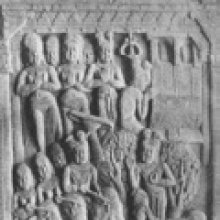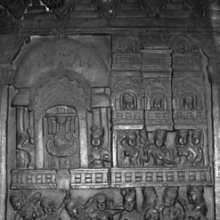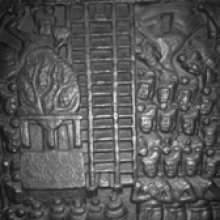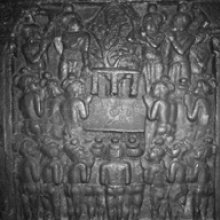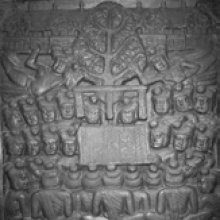Ajatasatru, Ajātaśatru, Ajātasatru, Ajatasattu, Ajātasattu, Ajatashatru, Ajata-shatru: 20 definitions
Introduction:
Ajatasatru means something in Buddhism, Pali, Hinduism, Sanskrit, Jainism, Prakrit, Marathi. If you want to know the exact meaning, history, etymology or English translation of this term then check out the descriptions on this page. Add your comment or reference to a book if you want to contribute to this summary article.
Ajatasatru has 20 English definitions available.
The Sanskrit term Ajātaśatru can be transliterated into English as Ajatasatru or Ajatashatru, using the IAST transliteration scheme (?).
Images (photo gallery)
Languages of India and abroad
Sanskrit dictionary
[Deutsch Wörterbuch]
Source: Cologne Digital Sanskrit Dictionaries: Böhtlingk and Roth Grosses Petersburger WörterbuchAjātaśatru (अजातशत्रु):—(ajāta + śatru)
1) adj. der keine Feinde hat: ajātaśatravaḥ — vanavāsinaḥ [Mahābhārata 12, 586.] für den kein (ebenbürtiger) Gegner da ist, Indra [Ṛgveda 5, 34, 1. 8, 82, 15.] —
2) m. Śiva, [Śivanāmasahasra] —
3) m. Nomen proprium Yudhiṣṭhira [Trikāṇḍaśeṣa 2, 8, 14.] [Hemacandra’s Abhidhānacintāmaṇi 707.] [Mahābhārata 12, 603. 698.] [Arjunasamāgama 1, 4.] ein König von Kāśi (kāśya) [Bṛhadāranyakopaniṣad 2, 1, 1.] [Kauṣītakyupaniṣad] in [Weber’s Indische Studien I, 175. 212. 419.] Sohn Bimbisāra’s, König von Rājagṛha und Zeitgenosse Śākyamuni’s, [Avadānaśataka] [DIVYA-Atharvavedasaṃhitā] in [Burnouf I, 145. 358.] Sohn Vidmisāra’s [Viṣṇupurāṇa 466]; vgl. ebend. [Nalopākhyāna 12.] und [Lassen’s Indische Alterthumskunde I, 709. 742. Anhang XXXIII. Bd. II, 76 fgg.] ein Sohn Śamīka’s [Harivaṃśa 1944.] ein Scholiast des Puṣpasūtra, [Weber’s Indische Studien I, 47.] — Vgl. ajātāri .
Source: Cologne Digital Sanskrit Dictionaries: Sanskrit-Wörterbuch in kürzerer FassungAjātaśatru (अजातशत्रु):——
1) Adj. keine Feinde habend ; dem kein Gegner gewachsen ist. —
2) m. Beiname Yudhiṣṭthira’s undNomen proprium verschiedener Männer.
Sanskrit, also spelled संस्कृतम् (saṃskṛtam), is an ancient language of India commonly seen as the grandmother of the Indo-European language family (even English!). Closely allied with Prakrit and Pali, Sanskrit is more exhaustive in both grammar and terms and has the most extensive collection of literature in the world, greatly surpassing its sister-languages Greek and Latin.
See also (Relevant definitions)
Partial matches: Shatru, Ajata.
Starts with: Ajatashatrukaukrityavinodana.
Full-text (+79): Ajatari, Ajatashatrava, Pataliputra, Dharbaka, Udayibhadra, Udayashva, Ajata, Ajataripu, Bimbisara, Ajatakhya, First Buddhist Council, Viditvisesa, Ajatshatru, Dhanapala, Haritamata Jataka, Vaidehiputra, Yudhishthira, Sattapanniguha, Videhiputta, Rajagaha.
Relevant text
Search found 69 books and stories containing Ajatasatru, Ajātaśatru, Ajātasatru, Ajatasattu, Ajātasattu, Ajatashatru, Ajātaśatrū, Ajata-shatru, Ajāta-śatru, Ajata-satru; (plurals include: Ajatasatrus, Ajātaśatrus, Ajātasatrus, Ajatasattus, Ajātasattus, Ajatashatrus, Ajātaśatrūs, shatrus, śatrus, satrus). You can also click to the full overview containing English textual excerpts. Below are direct links for the most relevant articles:
Amaravati Art in the Context of Andhra Archaeology (by Sreyashi Ray chowdhuri)
Ajatasatru visits Buddha < [Chapter 3 - Amarāvatī and the Formative Stage of the Buddhist Art]
Garga Samhita (English) (by Danavir Goswami)
Verse 8.13.56 < [Chapter 13 - A Thousand Names of Lord Balarāma]
A Discourse on Paticcasamuppada (by Venerable Mahasi Sayadaw)
Chapter 10 - Story Of Ajatasattu < [Part 8]
Chapter 9 - Four Kinds Of Kamma < [Part 8]
Chapter 4 - Ignorance And Illusion < [Part 2]
The Buddha and His Disciples (by Venerable S. Dhammika)
Maha Prajnaparamita Sastra (by Gelongma Karma Migme Chödrön)
Appendix 4 - Buddha’s subjugation of the elephant Nālāgiri (or Dhanapāla) < [Chapter XLII - The Great Loving-kindness and the Great Compassion of the Buddhas]
Appendix 7 - Description of Pāṭaliputra (present Patna) < [Chapter V - Rājagṛha]
Appendix 6 - Why the Buddha treated Devadatta as kheṭāśika (kheḷāsaka) < [Chapter XLI - The Eighteen Special Attributes of the Buddha]
Bihar and Eastern Uttar Pradesh (early history) (by Prakash Narayan)
State formation < [Chapter 1 - Political Formation at the time of Buddha]
Parents and Sons < [Chapter 4 - Social Process, Structures and Reformations]
Vanna (social identification) < [Chapter 4 - Social Process, Structures and Reformations]
Related products
